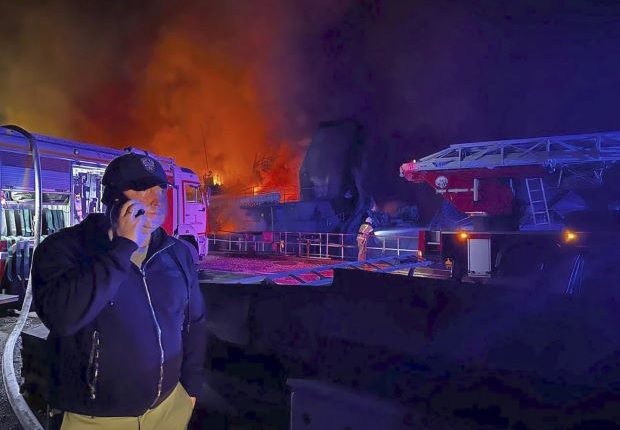Ukraine strikes the headquarters of Russia’s black sea fleet in Crimea

By Marc Santora and Andrés R. Martínez
KYIV – A Ukrainian attack targeting the headquarters of Russia’s Black Sea Fleet in Crimea damaged two ships and triggered a large blaze at a sprawling naval shipyard that plays a critical role in the Russian war effort, according to Russian and Ukrainian officials.
The pre-dawn attack Wednesday (13) appeared to be the largest on the Russian naval headquarters in the occupied port city of Sevastopol since Moscow launched its full-scale invasion of Ukraine nearly 19 months ago and underscored Ukraine’s growing capacity to hit targets deep into Russian-held territory.
The Russian Ministry of Defence said in a statement that Ukraine had fired 10 cruise missiles at the facility in the city of Sevastopol at the same time as it targeted a Russian warship on the Black Sea with three maritime drones. Air defence systems shot down seven cruise missiles, and the patrol ship Vasily Bykov destroyed the unmanned drones, the ministry said.
Moscow’s rare acknowledgment of a successful Ukrainian attack in Crimea came only after local residents posted images of explosions and raging fires in the shipyard on social media. Mikhail Razvozhaev, the Russian-backed governor of Crimea, later shared a photo that appeared to show the port side of a large landing ship that sustained damage.
Razvozhaev said that at least 24 people were injured at the Sevmorzavod shipyard. The initial explosions, and sounds of air defences, were first reported at about 2:00 a.m. local time.
It was unclear what weapons Ukraine deployed in the assault but the commander of the Ukrainian air force, Lt. Gen. Mykola Oleshchuk, suggested that an airstrike was involved.
“While the occupiers are still recovering from the night-time bombardment in Sevastopol, I would like to thank the pilots of the Ukrainian air force for their excellent combat work,” he wrote in a statement. “To be continued …”
Mykhailo Podolyak, a senior presidential adviser, hinted at Ukrainian responsibility for the attack. He said in a statement that the only way to secure trade routes and grain shipments through the Black Sea was to build up Ukraine’s armed forces capacity, “including by expanding the range of weapons.”
“We can already see the results of this” in Sevastopol, he wrote.
He did not elaborate on what weapons were used and it could not be determined. This summer, Ukraine acquired long-range weapons from the British and French, and Ukraine has also been developing its own domestically produced long-range cruise missiles.
The attack damaged an improved Kilo-class attack submarine, the Rostov-on-Don, and a Ropucha-class landing ship, the Minsk, according to Russian military bloggers and the Russian news outlet Baza, which did not cite sources.
The reports could not be independently confirmed but Russian officials said the attacks had damaged two ships that were in dry dock.
The attack on the Russian naval fleet comes only days after Ukraine said its forces had retaken several oil and gas drilling platforms on the Black Sea, which have played a role in Russia’s ability to project power off Ukraine’s coast since Moscow seized them in 2015.
Russian forces used the platforms, known as the Boyko Towers, as forward deployment bases, installing radar installations, long-range missile systems, and a host of other equipment. Dmytro Pletenchuk, a spokesperson for the Ukrainian navy, said driving Russian forces off the platforms “allows us to keep them devoid of pertinent information, rendering them unable to react promptly or plan anything within our waters.”
Around the same time as the Russian port was coming under attack, the Ukrainian military said it shot down 32 of 44 Iranian-made attack drones that were mainly targeting port and grain infrastructure in the Odesa region.
Oleh Kiper, the head of the Odesa military administration, said that the ports on the Danube River on the border with Romania were targeted once again and that at least six civilians were injured.
“We’re dealing with the aftermath,” he said in a statement. “Firefighters are working on containing the fire.”
The conflict on the Black Sea has escalated sharply since Russia pulled out of a deal in July that had allowed millions of tons of grain to be exported from Ukrainian ports to countries around the world.
The Kremlin then ramped up attacks on Ukrainian ports, grain facilities and other civilian infrastructure.
Crimea, which is home to Moscow’s Black Sea Fleet and studded with air bases, missile complexes and concentrations of troops, provides a vital link in the Russian war effort.
Limiting the flow of weapons and supplies from Russia through Crimea to occupation forces in southern Ukraine is important to Ukraine as its ground forces battle to break through Russian defensive lines.
-New York Times


Comments are closed, but trackbacks and pingbacks are open.